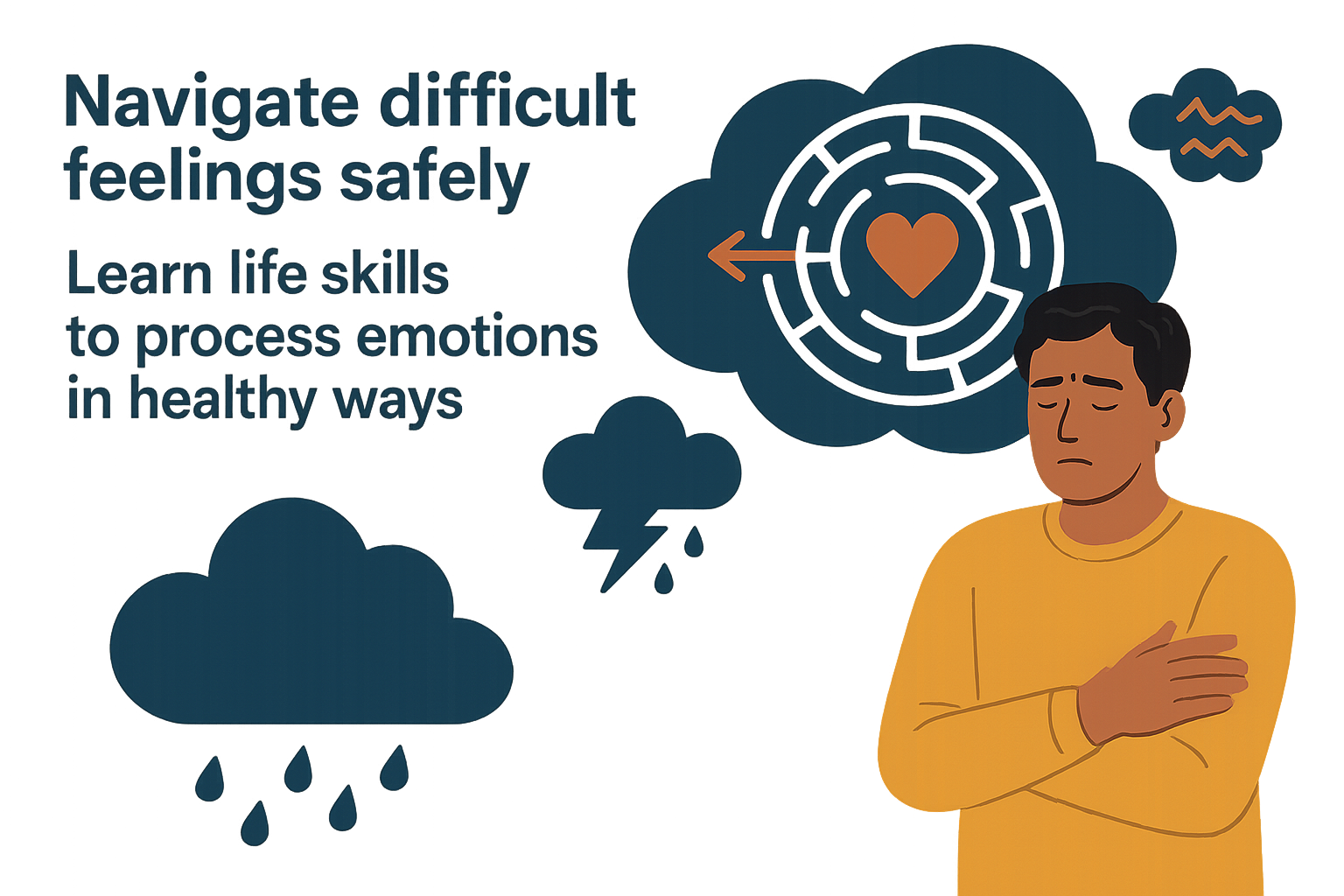Resilience & Life Transition Skills

Resilience & Life Transition Skills
Life skills for navigating grief, loss, and major life changes
Everything changed and nobody asked if you were ready. Now you're supposed to just... deal with it?
Maybe it's the job you thought was forever that suddenly isn't. Or the relationship that defined the last decade of your life. Or someone who was supposed to be there for the big moments who won't be. Or all your careful plans just... aren't the plan anymore.
And everyone keeps saying helpful things like "everything happens for a reason" and "you'll be stronger for this" while you're just trying to remember how to exist in this new reality where everything feels wrong.
Here's What's Actually Happening
Your brain is doing exactly what brains do when the ground shifts: freaking out. It's scanning for danger, replaying what happened, trying to make sense of something that doesn't make sense. Meanwhile, you're supposed to keep showing up to meetings and answering emails like you're not carrying around this invisible weight.
The worst part? There's no timeline for this. No project plan. No deliverables. Just this messy, non-linear process of figuring out who you are when everything that defined you is different.
Some days you're fine. Some days you're definitely not fine but pretending really hard. Some days you can't even pretend and hope nobody notices you've been staring at the same spreadsheet for an hour.
One widely accepted framework—the Dual Process Model of Coping—describes how grief involves oscillating between loss and restoration (letting yourself feel and also rebuilding capacity). That oscillation is normal, and even necessary for healing.
Neuroscience research confirms grief triggers inflammation and activation in brain regions tied to emotional processing—suggesting your experience is not just emotional, but biological.
What Mind Hack Lab Actually Does About It
We're not going to tell you to "move on" or "find closure" or any of that. We're going to teach you how to process what's happening without drowning in it.
Emotional Processing That Actually Works
Not the "journal your feelings" kind (though if that works for you, cool). The kind where you learn to feel the hard stuff without it taking over your entire day. Like:
- The 5-minute container technique that lets you feel without spiraling
- Bilateral processing that helps your brain actually file away difficult experiences instead of replaying them forever
- The window of tolerance mapping that shows you exactly how much you can handle before you need to tap out
Your Personal Emotional GPS
First thing we help you figure out? What you're actually feeling versus what you think you should be feeling. Turns out "I'm fine" isn't an emotion. Neither is "I should be over this by now."
Our AI coach helps you build emotional granularity without making you feel like you're in therapy. Angry? Okay, but is it betrayed-angry or powerless-angry or why-is-this-happening-to-me angry? Different emotions need different tools.
Pattern Recognition (But for Grief and Change)
Your response to major life changes probably follows a pattern. Maybe you go numb first, then angry, then make impulsive decisions, then crash. Maybe you throw yourself into work until your body forces you to stop. Once you see your pattern, you can work with it instead of against it.
The Actual Life Skills Part
This isn't just processing for processing's sake. It's learning how to:
- Show up to work when your personal life is imploding
- Make decisions when nothing feels certain
- Build a new normal when the old normal is gone
- Handle the random Tuesday afternoon grief ambushes
The Reality Check
This won't make the hard thing un-happen. It won't make you grateful for the growth opportunity or whatever. You might still have days where you can't concentrate, where everything feels heavy, where you wonder if this is just how it is now.
But you'll have tools for those days. Real ones that work in real situations. Like when grief hits in the middle of a client call. Or when you need to make a major decision but can't trust your judgment. Or when everyone else has moved on but you're still processing.
What People Experience
Start Where You Are
You don't have to be ready to "heal" or "move forward" or any of that. You just need 30 minutes and the willingness to try something that might actually help.
If you're reading this during your lunch break because you can't eat anyway, this is for you. If you're up at 2 AM googling "how long does grief last," this is for you. If you're functioning fine on the outside but falling apart on the inside, this is definitely for you.
The thing that changed your life already happened. Now it's about learning to live with what comes next.
No prep needed. No performance required. Just show up as you are right now, even if that's barely holding it together. Especially if that's barely holding it together.
P.S. - The AI coach doesn't give you platitudes or try to silver-line anything. It just helps you process what's real. Sometimes that's all we need - someone (or something) that lets us be honest about how hard this is.
Framework - Pillars - Master the Skills That Matter Most
Transform your professional performance, strengthen personal relationships, and build unshakeable inner strength with science-backed mind hacks.
This is all about you!
Professional Success Skills
Master the essential skills for workplace excellence and career advancement
Confidence & Calm Under Pressure
Master presentations, interviews, and high-stakes situations. Overcome anxiety, worry, and overthinking.
Perfect for: Professionals who want to excel in critical moments without letting nerves hold them back.
Stress Mastery & Work-Life Balance
Handle pressure without burnout, set healthy boundaries. Handle everyday stress and overwhelm.
Essential for: Maintaining peak performance while protecting your wellbeing and personal time.
Productivity & Achievement Mastery
Stop procrastination, build sustainable motivation.
Transform: Your ability to get things done and achieve your most ambitious goals.
Focus & Self-Management Skills
Improve concentration, build impulse control. Manage distraction and impulsivity.
Develop: Laser-sharp focus and the discipline to stay on track in our distraction-filled world.
Personal Relationship Skills
Build deeper connections and meaningful relationships in all areas of life
Connection & Communication Skills
Build authentic social confidence, master conversations.
Create: Deeper connections and communicate with impact in both personal and professional settings.
Emotional Mastery & Self-Forgiveness
Regulate emotions, express feelings constructively. Manage anger, guilt, and shame.
Transform: Difficult emotions into opportunities for growth and stronger relationships.
Resilience & Life Transition Skills
Navigate changes with strength, find growth in challenges. Navigate grief, loss, and major life changes.
Build: The emotional flexibility to thrive through life's inevitable ups and downs.
Inner Strength Skills
Cultivate unshakeable confidence and emotional resilience from within
Confidence & Self-Worth Building
Develop unshakeable self-confidence and personal power.
Build: A foundation of self-belief that empowers you to pursue your biggest dreams.
Motivation & Emotional Resilience
Reignite drive, build emotional strength that lasts. Manage low mood and boost motivation.
Create: Sustainable energy and enthusiasm for life, even during challenging times.
Rest & Recovery Mastery
Master quality sleep and nervous system regulation. Help with insomnia.
Optimize: Your recovery to maintain peak mental and physical performance.
